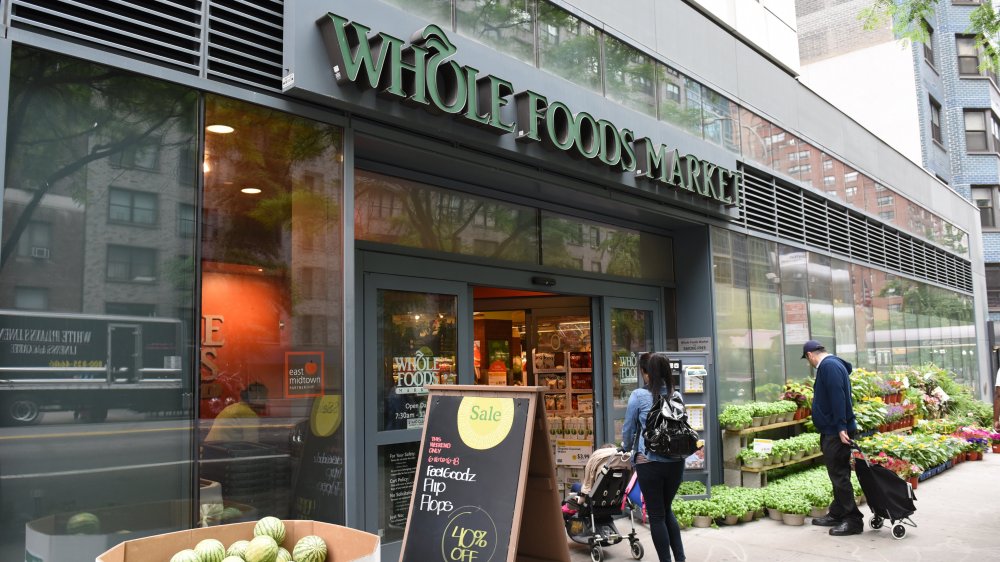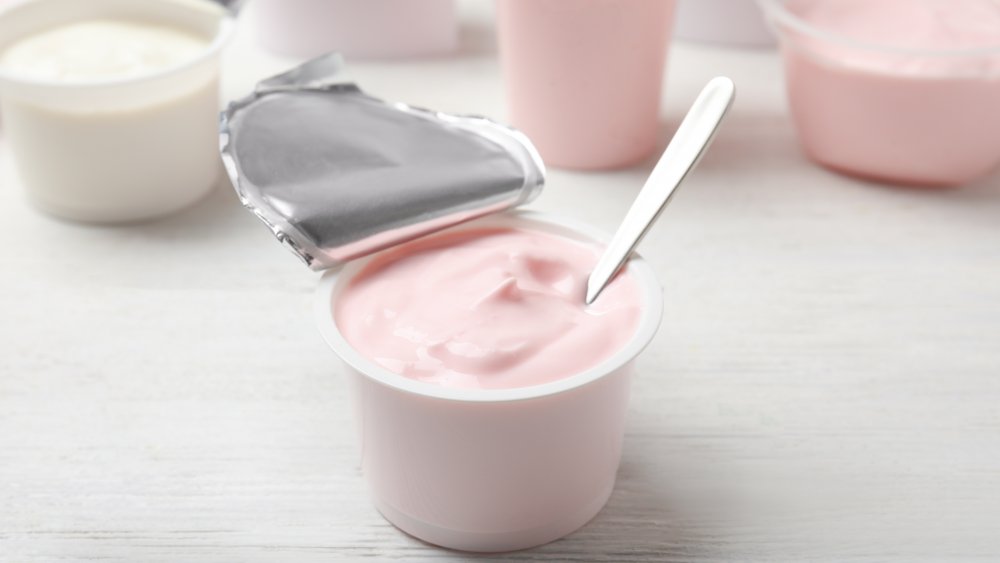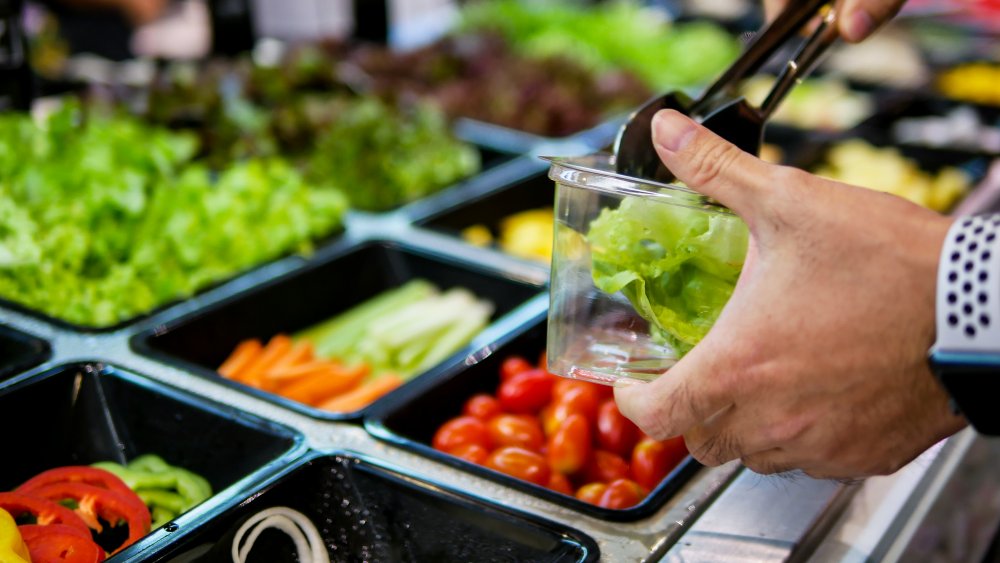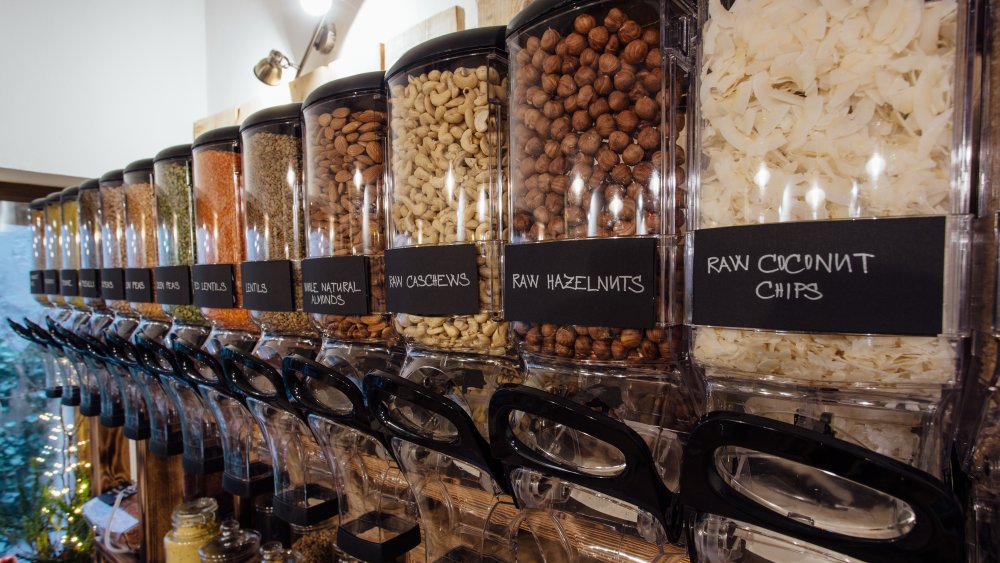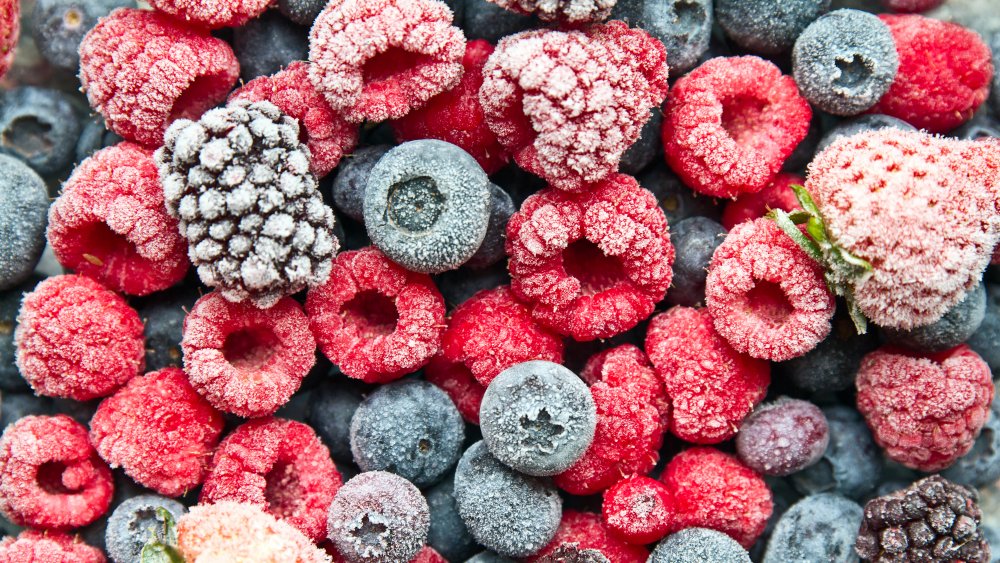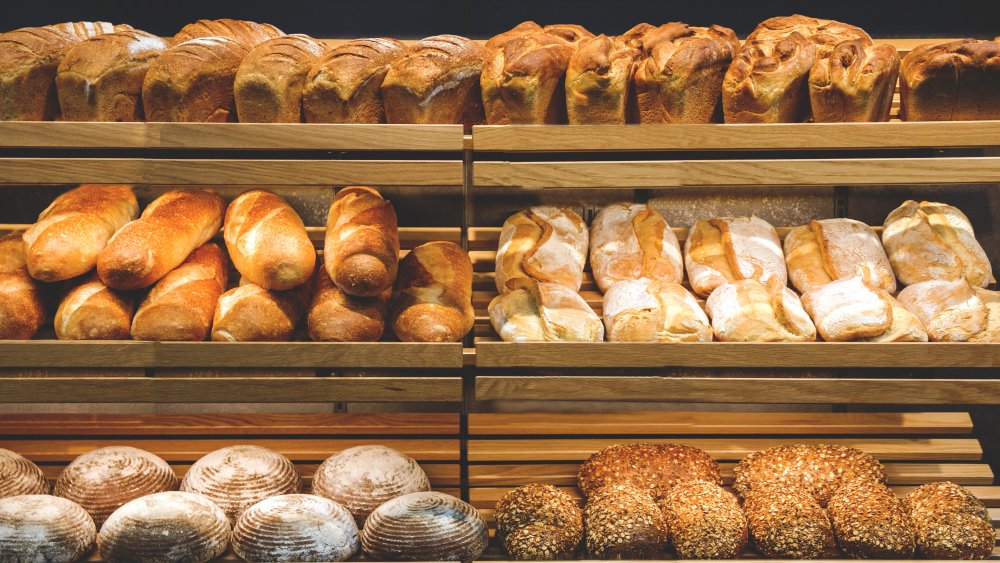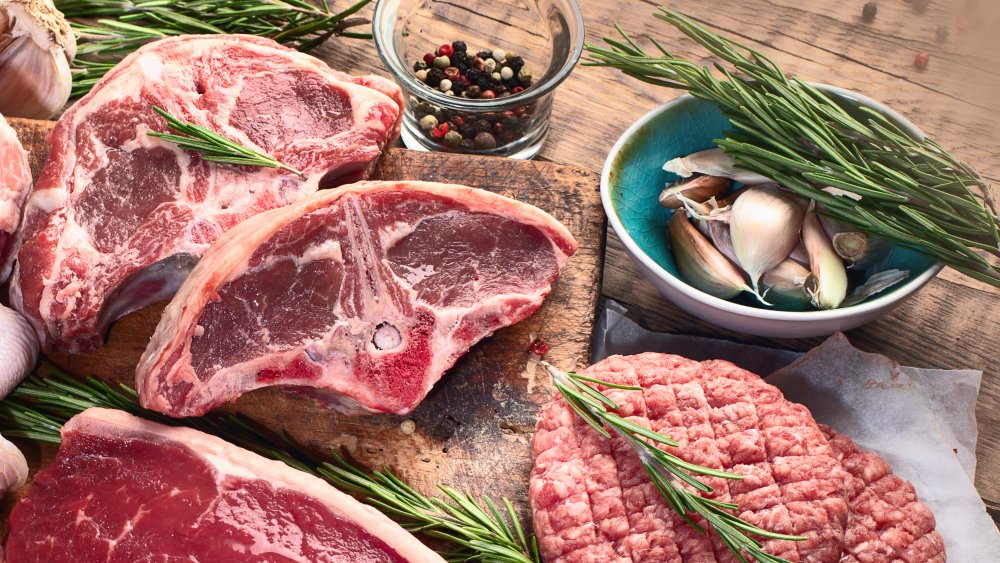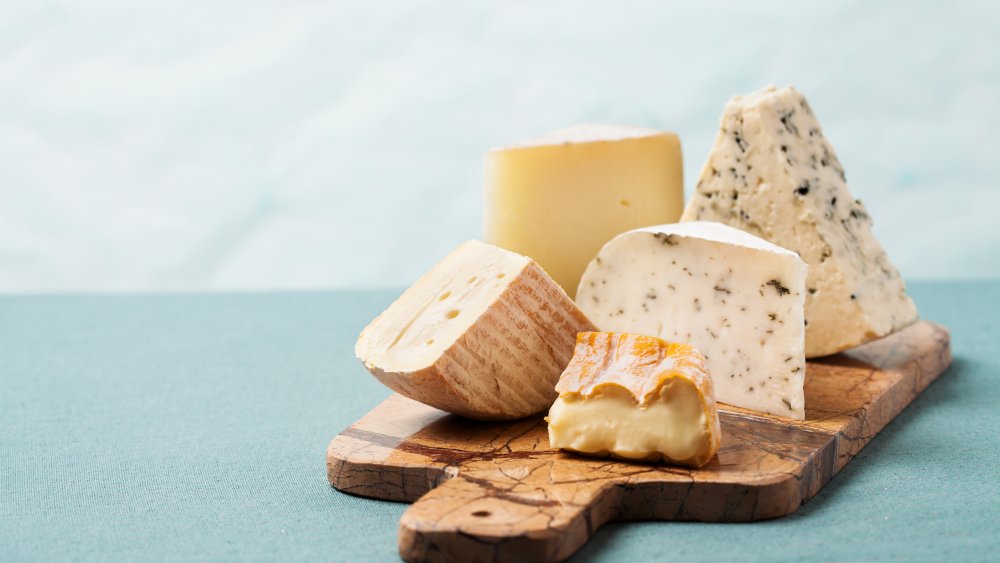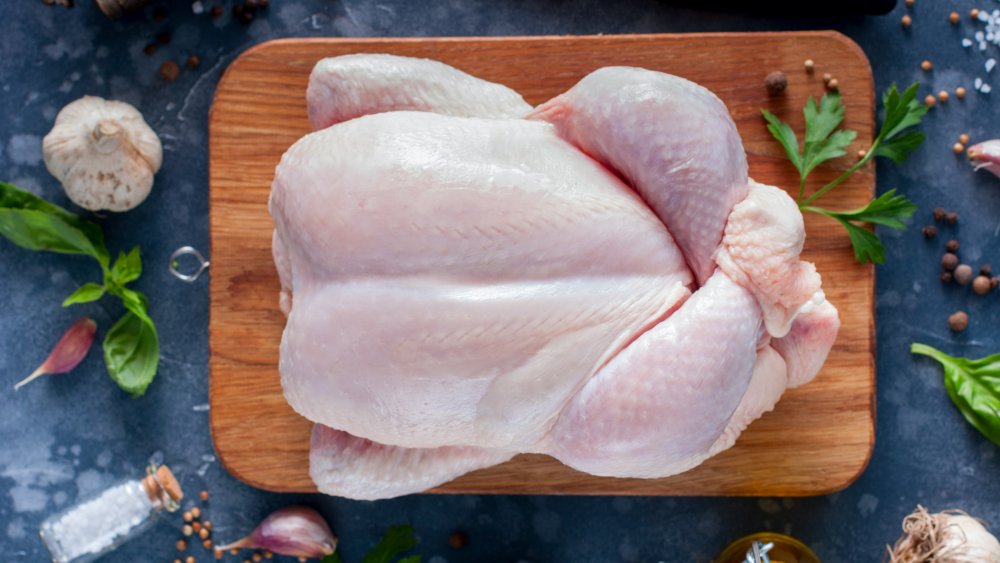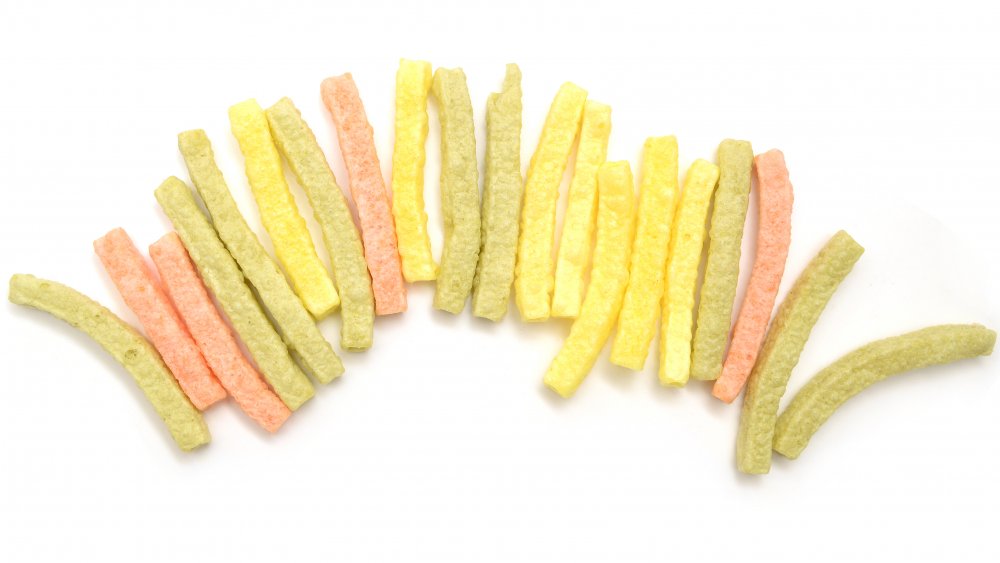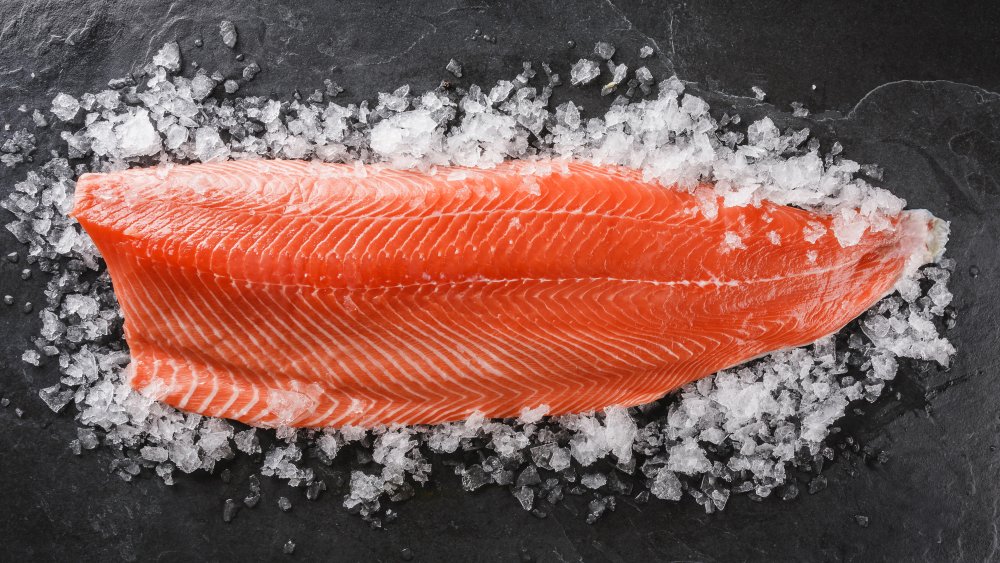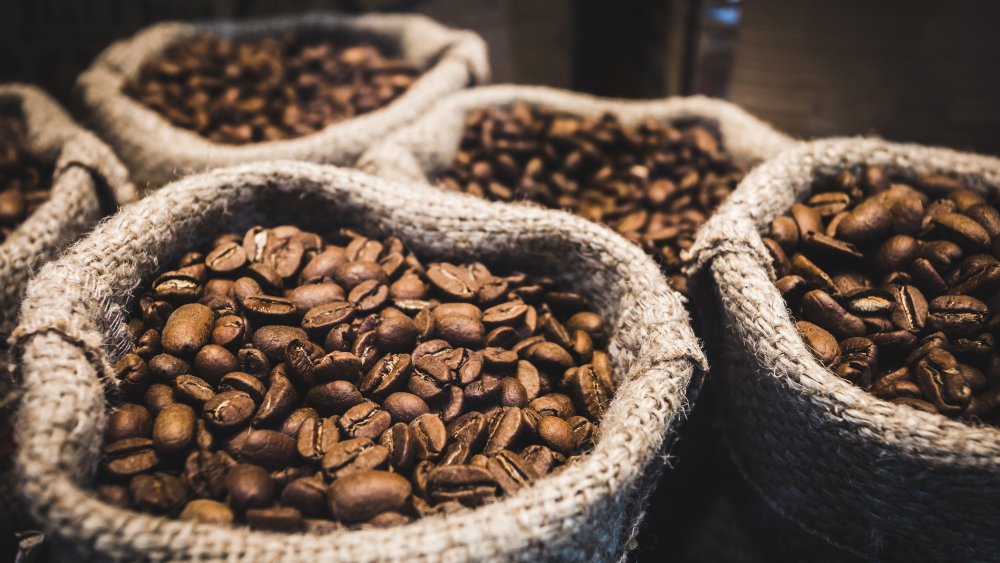7 Things You Should And 7 Things You Shouldn't Buy At Whole Foods
Once upon a time, Whole Foods Market earned itself a facetious but arguably accurate nickname: Whole Paycheck. Indeed, the chichi chain maintained a reputation for being a pricier place to get groceries. And while, according to Vox, Amazon's 2017 takeover of the brand has helped to drive down costs over the years (with extra perks offered to Prime members!), shopping at Whole Foods can still add up to be an expensive experience. Still, some loyal customers are happy to spend more for unique items from a company they feel is committed to bringing better, healthier options to the mass market.
Not all goods on the shelves at your local Whole Foods are created equal, though. You should always go into this hunger-inducing store with a curated list and a dose of personal restraint. And if you're not sure about an item? Try it before you buy it. You can ask to taste pretty much anything at Whole Foods, according to Thrillist. Don't want to swipe sample after sample on your next shopping trip? We've got you covered. Here are some of the best Whole Foods' items to purchase and a few options to skip altogether.
You should buy specialty yogurts at Whole Foods
There's a plethora of yogurt brands on the market. Lots of varieties are healthy and nutritious, but many others are deceptively loaded with sugar and added ingredients. Fortunately, if you shop at Whole Foods Market, you can feel confident that you're getting a more thoughtfully curated selection. According to the grocery chain's website, all the yogurts on their shelves contain "no artificial colors, flavors or preservatives."
There are also plenty of picks for those on a dairy-free diet. As VegNews revealed in 2019, Whole Foods launched their own 365 line of vegan yogurts made with almond milk. The store also carries the highly-rated Kite Hill dairy-free yogurts and Forager cashew-milk yogurts.
Don't worry if you prefer your yogurt with traditional cow's milk; the refrigerated section at Whole Foods is still chock full of delicious and creamy containers. With so many choices available, the expert testers at Spoon University tasted their way through every blueberry yogurt they could find at one Whole Foods Market, and created a ranked list. Their absolute favorite? Wallaby Organic 1.5% greek yogurt.
You shouldn't buy salad and hot bar items at Whole Foods
It can be tempting to end your Whole Foods Market trip with a quick stop at the salad bar or hot food station. The vast selection of fresh fruits, veggies, and hot entrees make for an easy on-the-go lunch or a convenient carry-out dinner. However, these buffets can also harbor illness-causing bacteria like E. coli, salmonella, and listeria, according to AARP. One of the worst offenders is pre-cut fruit. Cantaloupe, in particular, is especially dangerous as listeria "thrives" on its skin, according to a BabyCenter article by dietitian and nutritionist Naras Lapsys.
In addition to the potential health hazards lurking at the salad bar, serving yourself a ready-made meal at Whole Foods can be extremely expensive. If you do decide to splurge, Cooking Light has some tips to keep the cost factor down: Limit yourself to one tong-full of lighter veggies, squeeze or shake excess water from items before placing them in your container, avoid heavy items like grilled veggies, and keep the dressing on the side.
You should buy from the bulk department at Whole Foods
If you have thus far avoided the potentially overwhelming bulk department of Whole Foods Market, it may be time to reconsider this deliciously assorted aisle. From nuts and seeds to herbs and spices to beans and legumes to pasta and oats, there are loads of tasty morsels to enjoy in excess or in moderation. You can buy as much or as little of an item as you want — so it is a great place to discover new and exciting flavors without making a big commitment.
Furthermore, you can purchase the exact amount needed for a specific recipe, making it is a less wasteful, more sustainable way to shop. But, best of all, purchasing an ingredient from this help-yourself section of Whole Foods is usually less expensive than buying the same pre-packaged item, Cooking Light reported, because when you "take fancy marketing and labels out of the equation, the prices drop like magic."
You shouldn't buy paper goods and toiletries at Whole Foods
One-stop shopping certainly has its perks when you're on the go and running errands. Still, Whole Foods Market is probably not the best option for stocking up on everything you need to keep your home running smoothly. This rings especially true for non-food items like paper goods, household essentials, and toiletries. "It's way easier to pick up items like light bulbs, garbage bags or toilet paper when you're already at the store, but you'll pay the price at Whole Foods," CouponCabin.com president Jackie Warrick told NBC's Today.
That said, Whole Foods does carry an impressive selection of sustainable products, so if reducing your carbon footprint is more important to you than saving some coin, "you may find the extra money well worth spending," as Today noted. Convenience with a conscience or an extra stop and more money saved — you do the math and make the right choice for your family.
You should buy frozen fruit at Whole Foods
The produce section of Whole Foods is a sight to be seen. But stocking up on all those beautiful fresh fruits and veggies will add up quickly. While some items are worth the splurge, you may be better off scooping up much of your bounty elsewhere. A better idea may be to buy a bulk bag of store-brand (365) organic frozen berries or vegetables.
As noted by Kitchn, these items are generally well priced, between $3 and $5. Plus, frozen fruit won't spoil — so you can whip up a delicious smoothie or dessert any day, yearound, regardless of what's currently in season. Better yet, fruits that are going to be frozen are often picked when they're perfectly ripe. Since they're frozen soon after being harvested, they retain their nutritional value, and, unlike fresh fruit, they aren't often treated with chemicals, as noted by Healthline.
If you want fresh fruit, though, it's important to prioritize seasonal purchases. Heith Banowetz, a long-time Whole Foods employee, told HuffPost that the freshest, most in-season produce is always positioned to greet and tempt you when you walk inside your local Whole Foods. He also revealed that you can separate items like grapes and cherries to meet your needs and your budget — game-changer!
You shouldn't buy flowers at Whole Foods
Treating yourself to a bright and cheerful bouquet of flowers can be the icing on the cake of a successful grocery store trip. Whole Foods Market does a great job of luring us in with beautiful bouquets and colorful blooms. And while it might be tempting to snap up one of those adorable mason jar mini bouquets, you may want to stop and reconsider before shelling out the extra cash.
Whole Foods generally charges about $9.99 for a modest bunch of mixed flowers, as noted by Kitchn, but you can get a very similar curated creation at Trader Joe's for just $5.99. Likewise, a dozen roses at Whole Foods will cost you around $12.99 as opposed to $6.99 at Trader Joe's. Additionally, one Kitchn writer detailed her recurring experience buying bouquets at Whole Foods, revealing that she repeatedly found that flowers from the chain barely lasted a few days.
You should buy fresh bread and bakery treats at Whole Foods
You can steer clear of certain aisles and entire sections of Whole Foods Market without feeling like you're missing much, but one area you won't want to pass up is the bakery. Kitchn noted that most of their baked goods are actually baked right on site. Indeed, we are not talking about your regular old grocery store's collection of stale breads and generic sponge cakes.
You can see and taste the difference at Whole Foods, making these crave-inducing items well worth the slightly higher expense. Furthermore, Whole Foods confirms on its website that their "breads, cakes, cookies, pies and more are made with unbleached, unbromated flour" and the asserts the chain does not use "hydrogenated fats, high-fructose corn syrup or artificial sweeteners."
Another interesting fact? The test kitchen at Whole Foods' mid-Atlantic regional headquarters in Maryland was recently equipped with a New York WaterMaker, according to Progressive Grocer. As its name aptly implies, this machine replicates the taste and specific conditions of New York water for optimal baking of items like pizza, bagels, and other bread and pastry items.
You shouldn't buy beef at Whole Foods
According to CNBC, data by Morgan Stanley determined that the price of meat at Whole Foods is generally 34 percent higher than that of other large grocery chains. What's more, you're not always getting a cut above the competition when you purchase your proteins at Whole Foods. Bloomberg reported that the Open Prairie Natural Angus Beef sold at Whole Foods is actually produced by the same food giant that makes Tyson — a brand you can find in almost any grocery store. Meanwhile, the Meyer Natural Angus Beef on Whole Foods shelves comes from a Cargrill processing facility. This doesn't mean that the meat isn't of good quality; it just shows that you can get the exact same or a similar caliber item elsewhere for a whole lot less money.
However, you can get more than a piece of meat for your money at Whole Foods. According to the chain's website, the local butchers at each store will tie your roast by hand, cut steaks to order, and even marinate your meat selection.
You should buy specialty cheeses at Whole Foods
We won't lie, the selection at the cheese department in Whole Foods Market can get pretty pricey. A hunk of high-end gouda can set you back big time, but the cost makes sense once you realize how serious Whole Foods is about their cheese. Cathy Strange, global cheese buyer for the grocery chain, revealed on the Whole Foods website (via Bustle), "I take great pleasure in honoring their passions as well as those of the cheese makers producing the high-quality cheeses we bring to our stores. Cheese takes a wonderful journey to get to our stores and our Team Members do a great job in honoring that journey."
Whole Foods' cheese is wonderful, and fortunately, if you shop this section thoughtfully and strategically, you can walk away with a decent deal and the delicious makings of a gourmet snack plate. "Just past the giant wheels of brie and sharp cheddar, there often sits a basket of what looks like tiny, rejected hunks of cheese," wrote Delish. "They're actually just the odds and ends that haven't sold fast enough, and you can usually scoop them up for under $3."
You shouldn't buy chicken at Whole Foods
You might think that you're getting a better-quality chicken when you shop at Whole Foods, but, many times, the store's selection of proteins is on a level with that of its more mainstream competitors. Still, brand perception could have you paying significantly more for essentially the same product. An article published by Bloomberg found that many of Whole Foods 365 brand chickens were raised by Perdue farmers and processed in the same facility used by the poultry giant. "What used to be more unique ... has now become really par for the course, certainly among your larger chains and your progressive grocers," David Sprinkle, a researcher at Packaged Facts, told the publication.
However, that's not all bad. Thanks to the stringent meat standards — like ones calling for cage- and hormone-free regulations — set by companies like Whole Foods, "the gulf has narrowed — and sometimes has even closed — between what's sold at Whole Foods and what's produced by industrial food giants such as Perdue Farms Inc. and sold at lower-cost supermarkets," noted Bloomberg.
You should buy personal care products at Whole Foods
You can skip the perfume-heavy beauty counters at overcrowded mall department stores. Next time you need a beauty boost — be it haircare products, makeup, or skincare products — try the personal-care section of your local Whole Foods Market. There's a plethora of options for your unique needs and, while the company's own 365 line of basic products are well regarded (the coconut oil is especially beloved), there are other amazing brands to be discovered as well. According to Self, some of the must-try best-selling products include Dr. Hauschka Translucent Body Tint, Trilogy Rosehip Oil, and Weleda Skin Food, all of which range between $9 and $30.
Amy Jargo, a global senior category merchant for Whole Body at Whole Foods Market, told Mindbodygreen that the store's loyal customers one-stop shop at Whole Foods since they are not only cognizant of the food they consume, but also concerned with the ingredients in their personal care items. "Our goal is to provide the highest quality natural and organic beauty and body care products for our customers and do the research so they don't have to." She further explained that Whole Foods has banned over 100 common ingredients present in many of the everyday beauty items widely sold at other stores.
You shouldn't buy these 365 products at Whole Foods
Sorry to break it to you, but those french fry-shaped veggie straws and 365 brand multi-colored chips you've been happily munching on are in no way a substitute for vegetables — and they are not that much better than regular old potato chips.
As reported by Business Insider, consuming 40 of these veggie chips will cost you 130 calories. And since they are not particularly nutritious or even moderately filling (it's basically like eating air), you're not fueling your body with the energy it needs. Furthermore, the word "veggie" in the label is very misleading. An article in Time noted that many of these types of chips have a "health halo effect," meaning they trick us into thinking we're eating something relatively harmless or even good for us. The packaging is deceptive and can lead people to believe they are getting healthy benefits. But they're not. In this instance, there is a negligible amount of real veggies in your veggie chips.
You should buy fresh fish at Whole Foods
Whole Foods Market has a vast array of fresh fish on display. It can be an intimidating part of the store at first glance but, luckily, you don't have to be a seafood connoisseur to get quality selections. In fact, the experts at Whole Foods are more than willing to help. The store's website boasts the amazing things their fishmongers can do for you — and it's a whole lot more than wrapping up a piece of salmon. They'll tell you where your pick is from, how it was raised and caught, and even suggest the best ways to prepare it. Plus, they'll debone fillets, peel and devein shrimp, and crack crab shells for you. They'll season or marinate your selection too.
Better yet, according to Business Insider, Whole Foods exceeds many of the strictest "quality standards for fish of any grocery store and is committed to sustainable seafood and responsible farming."
You shouldn't buy coffee at Whole Foods
The aroma of the coffee section of Whole Foods can be especially alluring to java aficionados. But don't give in to temptation, unless you are willing to spend big on your beans. You and your wallet are better off bagging beans and grinds elsewhere — like at Trader Joe's. The price difference for a similar selection can be quite significant.
Furthermore, even high-end super markets are not the ideal place to buy coffee. This is because beans and grinds often sit on the shelves for longer than intended. "If you really want to enjoy the coffee, buy it within a week of the roast, buy it locally and drink it within a week of purchasing it," Ric Rhinehart, executive director of the Specialty Coffee Association, told The Washington Post. The 2016 article found that many boutique brand coffee roasters found their bags of beans sitting stagnant at Whole Foods long after their listed best-buy dates. While not an unsafe practice, it's certainly not ideal in terms of taste and quality.
